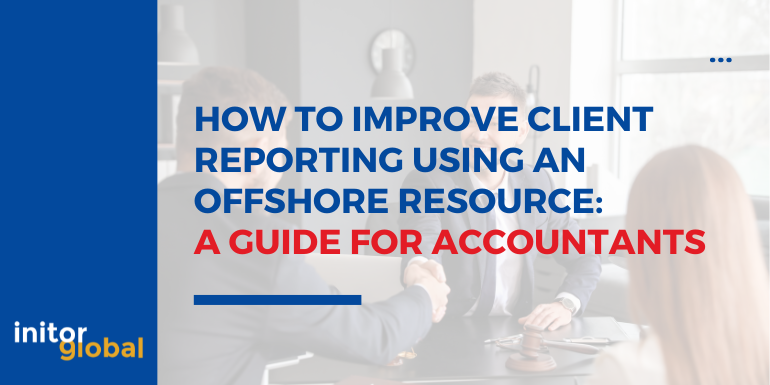For accountants, accuracy is non-negotiable, and trust is earned one report at a time. Whether it’s financial statements, tax calculations, or management information, clients rely on their accountants not just to get the numbers right, but to make sense of them.
As more accountants turn to offshore teams to handle growing workloads and seasonal peaks of work, a further challenge becomes clear: how do you maintain the same level of accuracy, professionalism, and effective communication across onshore and offshore teams?
The answer lies in building a system where offshore support underpins effective client reporting and communication.
Use an offshore resource to support effective client reporting
From management information to trial balance preparation, balance sheets to tax calculations, errors in accounting carry serious consequences. A single error can impact compliance, damage client confidence, and affect a firms professional reputation.
Offshore teams, when properly integrated into a firm’s’ operations, can help accountants:
- Process large volumes of financial data quickly and efficiently
- Deliver consistent, high-quality information at peak times
- Free up onshore teams to focus on client relationships and upselling work.
Five steps to enhance client reporting using an offshore resources
01. Standardise Reporting Templates and KPIs
Most cloud accounting software generate real-time reports. Using offshore bookkeeping support facilitates the systematic maintenance of accounting records, ensuring up to date financial information is always available for clients.
Offshore accountants can also prepare Key Performance Indicators for a client with the critical information needed to underpin their decision-making process. This allows the onshore team time and space to help clients grow their business knowing management information will be available in real time.
02. Build a long-term offshore relationship
Building a strong relationship with an outsourcing provider enables better understanding, improves service quality, and enhances mutual trust. Consistent collaboration will yield better results over time.
Even with outsourcing partners experienced in producing real-time information, some level of training and onboarding will be necessary. Investing time in aligning processes between offshore and onshore teams along with continuous training ensures offshore accountants are equipped to deliver better results.
Offshore accountants will need to understand client industries, business models, and reporting nuances. A few hours of collaborative onboarding reduces the risk of errors and any misunderstanding about the scope of client reports to be produced.
03. Review data security arrangements
There are many ways to share data securely with an offshore accountant, including:
- Secure File Transfer Protocol (SFTP)
- Cloud-based collaboration tools
- Remote access to onshore servers
Regardless of arrangements, the onshore accountant needs to be confident in the offshore IT and physical safeguards, such as anti-virus software, secure VPN connections, and 24/7 surveillance in place.
04. Create a feedback loop and Quality Review Process
Most accountants test the outsourcing process with a small amount of lower risk work, such as bookkeeping, VAT return preparation or year-end accounts preparation. Outcomes are then evaluated for quality, technical accuracy, and turnaround against performance indicators consistent with in-house targets. Integrating the offshore accountants with existing quality assurance and professional compliance reviews helps minimise the risk of errors and omissions and gives the onshore accountant confidence to outsource more complex work as the relationship develops.
05. The role of automation and human oversight
Investment in new technologies such as cloud accounting and automation of tasks means accountants can introduce outsourced partners into their day-to-day operations with the minimum of disruption. This allows firms to increase their capacity and range of services without taking on the additional risk and costs of direct employment. Investing time with the individuals provided by the outsourced partner will introduce firms to new ways of working, a different mindset for delivery and a more cohesive business.
While automation can assist with bank feeds, reconciliations, and recurring reports, human oversight is still vital. Offshore teams can bring this oversight, ensuring automated reports align with client expectations, regulatory frameworks, and market conditions.
A well-resourced offshore team can validate data, identify trends and anomalies, and add context that automation alone cannot deliver.
Conclusion
Outsourcing is not a one-size-fits-all solution, but with careful planning and the right partnerships, it can be a game-changer for accountants looking to support clients with real-time reporting. Advancements in technology and collaboration tools, enhanced data security, and flexible delivery models make outsourcing an effective way of doing business.
Initor Global’s outsourced tax and accounting services are suitable for all client engagements – from sole traders and micro businesses to large companies. We offer a free trial before any engagement commences.
If you are an accountant looking to outsource services, increase margins and help your client’s thrive, you can book a video call with one of Initor Global’s expert advisors using this link or send an email to [email protected].











 Book a Meeting
Book a Meeting